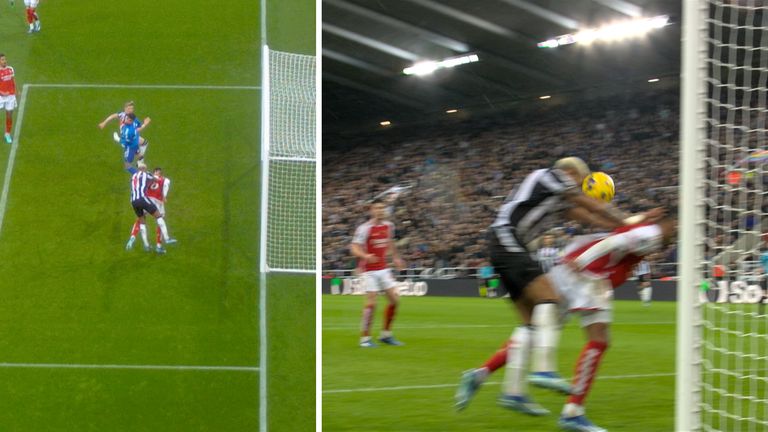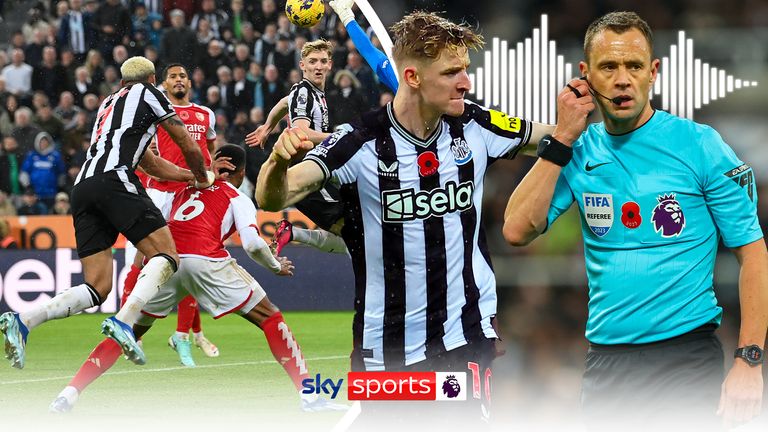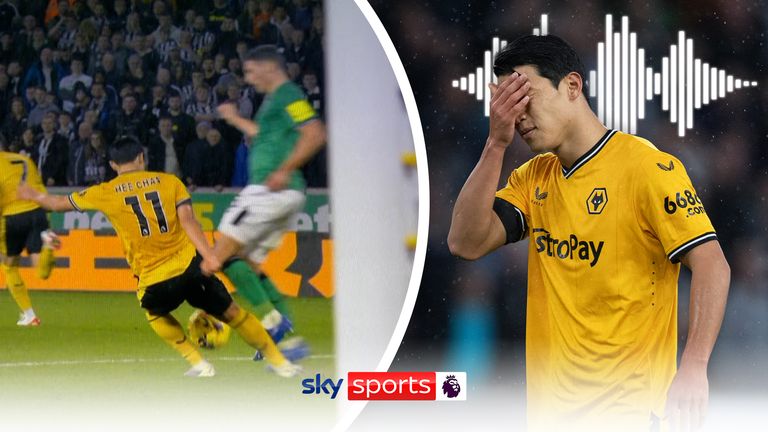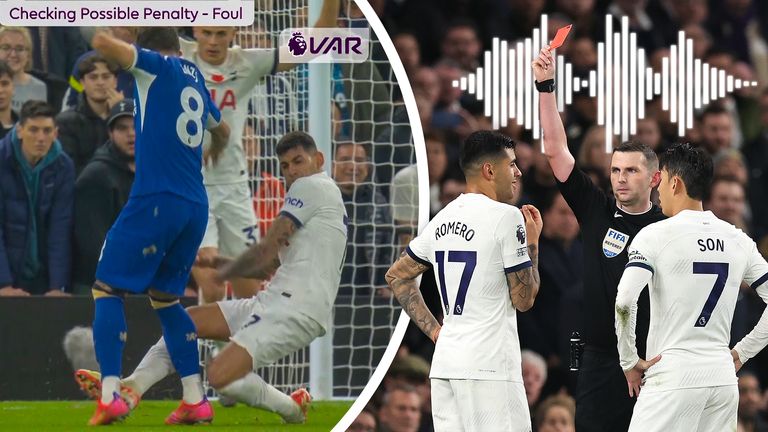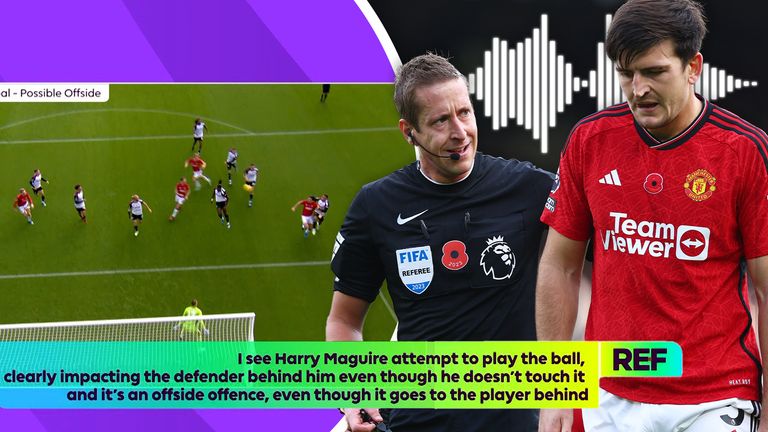Match Officials: Mic'd Up - Anthony Gordon goal and Cristian Romero red card discussed by PGMOL chief Howard Webb
Howard Webb addresses the award of Anthony Gordon's contentious goal for Newcastle against Arsenal and why Tottenham's Cristian Romero saw red against Chelsea in the latest episode of Match Officials: Mic'd Up alongside former Liverpool and Man Utd striker Michael Owen
Wednesday 15 November 2023 10:56, UK
In the latest instalment of Match Officials: Mic'd Up, PGMOL chief Howard Webb explains why Anthony Gordon's goal for Newcastle against Arsenal survived various VAR checks, and dissects Cristian Romero's red card in the frenzied game between Spurs and Chelsea.
- Read full transcript from Match Officials: Mic'd Up
- Stream the biggest moments on NOW
- Live Premier League table | Fixtures | Results
- Watch free Premier League highlights
- Get Sky Sports | Download the Sky Sports App
In full: Webb's analysis of Gordon goal for Newcastle vs Arsenal
Anthony Gordon's strike survives multiple VAR checks and is awarded in favour of Newcastle against Arsenal.
Michael Owen: What did you make of this situation?
Howard Webb: This was a big moment, an unusual situation with three aspects for the VAR to check whether the on-field decision of goal should be overturned.
We see the ball getting very close to the goal line, don't forget we've got an assistant referee who was right in line. The ball does not have a lot of pace as it goes to the goal line, so he is looking right along the goal line, better than any of our cameras.
Trending
- Transfer Centre LIVE! Bayern want Dortmund's English winger Gittens
- Liverpool latest: Slot says it's 'so hard' to win a league
- PL Predictions: Forest to turn up heat on stubborn Ange
- Tarkowski: Everton are confident of getting result at Man City
- Littler targets nine-dart history: 'It's becoming a frustration'
- Amorim: Man Utd are maybe in one of their lowest moments
- Man Utd latest: Dalot spends Christmas Eve helping homeless
- World Darts Championship schedule: Who is playing when after Christmas?
- Is this the man to dethrone Usyk? 'He would knock him out!'
- How does a 'different' Arsenal cope without Saka?
We know the ball is curved so it can be overhanging the line and we need evidence that it is out. The ball comes over and Joelinton challenges Gabriel. It could be a foul, it might be a foul. The VAR decides the evidence from the footage isn't clear enough to intervene for a review for a clear error. The fact opinion is split after a lot of analysis since the situation suggests that was correct non-intervention because of that subjectivity.
And then one of those unusual situations where the ball goes between two players and trying to identify exactly when the ball leaves Joelinton is really difficult to establish. So again, no conclusive evidence that Gordon was offside when the ball was last touched to him. The VAR went through that diligently and identified no clear evidence to intervene to overturn the goal. The process actually was correct.
Michael Owen: What did you make of Bruno Guimaraes and Kai Havertz tackles?
Howard Webb: Quite a busy game, a lot happening in this important game. A couple of situations that in the cold light of day and analysis that we go through, going forward we would expect red cards in both of those situations.
Read full official's audio transcript from this incident
In full: Webb's analysis of Newcastle penalty vs Wolves for Hwang challenge on Schar
VAR failed to intervene when the on-field referee awarded Newcastle a penalty for a dubious challenge by Hee-Chan Hwang on Fabian Schar.
Michael Owen: That is adjudged to have been error. How did that happen?
Howard Webb: We said from the outset that VAR shouldn't be re-refereeing the game. It should reserve itself for situations when a clear error has occurred on the field and the VAR steps in to have that rectified.
The VAR is looking for evidence of that clear error and weighing up the different considerations. For example, has the defender played the ball? Is there contact between the players?
In this situation we see that Hwang doesn't actually play the ball, the ball is played on to him by Schar and then there is contact between the two of them. But what the referee has seen in real time is Hwang bring that leg through, making contact with Schar.
Now when we can see the replay, we can see that Hwang actually pulls his swing back a little bit and stops it from going right through and Schar just brings his foot through and there is contact. We feel this is a situation that reaches the threshold for being a clear and obvious error, even though there is contact and even though the ball isn't played by Hwang.
We are asking the VAR going forward with that instruction to have a look at it, see where the considerations sit and if they don't like the decision on the field ask the referee what they saw and if it is significantly different to what's been shown on the video, then recommend a review so the referee can go to the screen and look at it again for himself.
The starting point being where the VAR thinks it's a clear error. In this situation the VAR didn't quite get there and in our opinion should have done.
Michael Owen: Does the high bar that we often refer to interfere with the decision-making process?
Howard Webb: We think the high-bar for intervention which we apply, which UEFA applies as well, is good for consistency. There's a lot of subjective situations in our game which split opinion. We don't want too much interference, we've seen negative comments about over-interference by VAR so reserving it for clear situations, we feel it serves the game best. Recognising those clear situations is important, it's where we put a lot of time and effort into the training. This situation meets the threshold and that's the advice that we have given our VARs moving forward.
Read full official's audio transcript from this incident
In full: Webb's analysis of Jackson offside, Romero red card for Enzo tackle
VAR has to decipher whether Chelsea forward Nicolas Jackson is standing in an offside position when dummying Moises Caicedo's successful strike at goal, before taking a stance on Cristian Romero's challenge inside the box on Enzo Fernandez.
Michael Owen: Another complicated one - pleased with the decision making?
Howard Webb: What a great game this was. So intense. A great spectacle for the Premier League. I thought the officials did really well on field and in the VAR hub.
We've seen a situation where a penalty was missed on the field but these aren't always easy to identify in full speed. I know the check took a bit of time but VAR had to go through that process diligently to establish the offside - which was the on field call - and then we had to look at the passage before that with Romero going in on Enzo. Excellent process.
Michael Owen: It's clear to see Romero gets the ball - explain why it's a penalty?
Howard Webb: Just playing the ball itself does not allow you to follow through in this way. We don't see much contact like this, and that's for a reason, players normally take care when playing the ball to avoid this from happening. This clearly endangers the safety of Enzo, with excessive force, and when we see that at full speed and slo-mo it's a red card - a good intervention.
Read full official's audio transcript from this incident
In full: Webb's analysis of McTominay goal vs Fulham ruled out for Maguire offside
Scott McTominay's goal is awarded on-field for Manchester United but Harry Maguire is offside and is adjudged to be interfering with play.
Michael Owen: Why do referees only go to the monitor for certain offside decisions?
Howard Webb: Just being in an offside position in itself isn't an offence. It all depends on what you do when you're in that position.
If you touch the ball as an attacker in an offside position or play the ball then that's an offence of interfering with play. That's factual and when that happens, the referee doesn't need to go to the screen.
But you can also commit an offence without touching the ball as an attacker in an offside position. It all depends on what you do in that position and that needs a judgement by the match officials. It depends whether you interfere with an opponent.
What we see Harry Maguire do here is attempt to play a ball that's close to him, he challenges an opponent for the ball and he makes an obvious action by moving towards that defender Rodrigo Muniz which impacts his ability to play the ball.
If you take Maguire out of that situation, Muniz has got an opportunity to clear the ball before it gets to Garnacho. But it needs a judgement by the officials, so the VAR will ask the referee to go to the screen to make that subjective just like the referee does in all the other subjective areas of the game.
A good intervention and correctly the referee was sent to the screen.
Michael Owen: How pleased were you with the assistant VAR in that situation?
Howard Webb: Sian Massey-Ellis was excellent. She flagged up to the VAR Jarred Gillett that Maguire had, in her opinion, interfered with Muniz. They worked as a team. We've asked them to do that. We instruct them to work together, to share opinion. We've learnt from recent situations where maybe that hasn't always happened and this was a really good example of some great work by the AVAR.
Michael Owen: One frustration for fans is how long it takes to get these offside decisions done. Where are we with semi-automated offsides?
Howard Webb: I understand that frustration. Obviously, if the situation is really close, it can take a bit of time using the technology to come out with the right answer. We're open-minded to all technologies that make us more accurate and make us more efficient. We're doing some testing behind the scenes. We'll see how that goes. We're keeping a close eye on other competitions and we'll take a decision in terms of the best way to go forward with that.
Read full official's audio transcript from this incident
Watch Match Officials: Mic'd Up on Sky Sports, and catch up on SkySports.com, the Sky Sports App and Sky Sports social channels.
